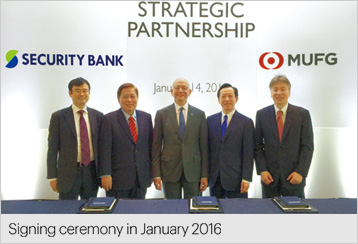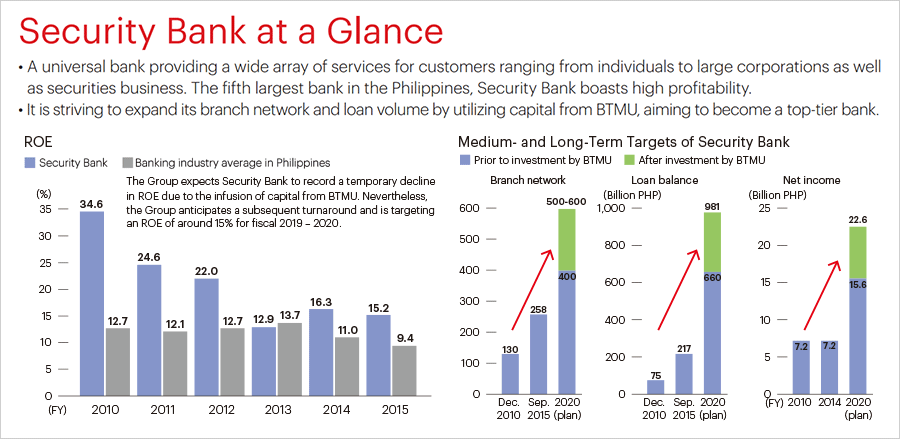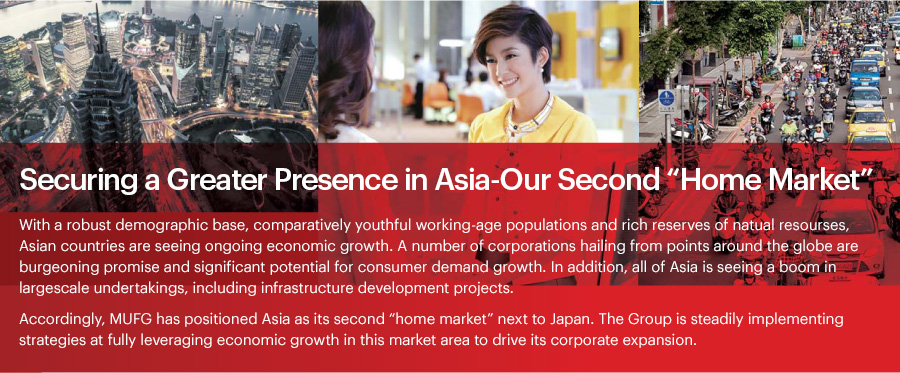Serving Asian Markets for More Than a Century
MUFG’s century-long business track record in Asia dates back to the establishment of a Beijing representative office by Yokohama Specie Bank in 1893. After the end of World War II, the Group expanded its regional network as its Japanese corporate customers made forays into markets elsewhere in Asia. Over the years, MUFG and its precursors provided financial services to support customers’ business growth while contributing to the development of the countries in which they operate through such financial solutions as project and trade finance. Having positioned Asia as its second “home market,” the Group is now actively enhancing its service lineup by, for example, acquiring a majority of Krungsri (Bank of Ayudhya) and forming capital and business alliances with VietinBank in Vietnam and Security Bank in the Philippines. In this ways, MUFG is providing comprehensive financial services tailored to the needs of local customers ranging from individuals to companies.
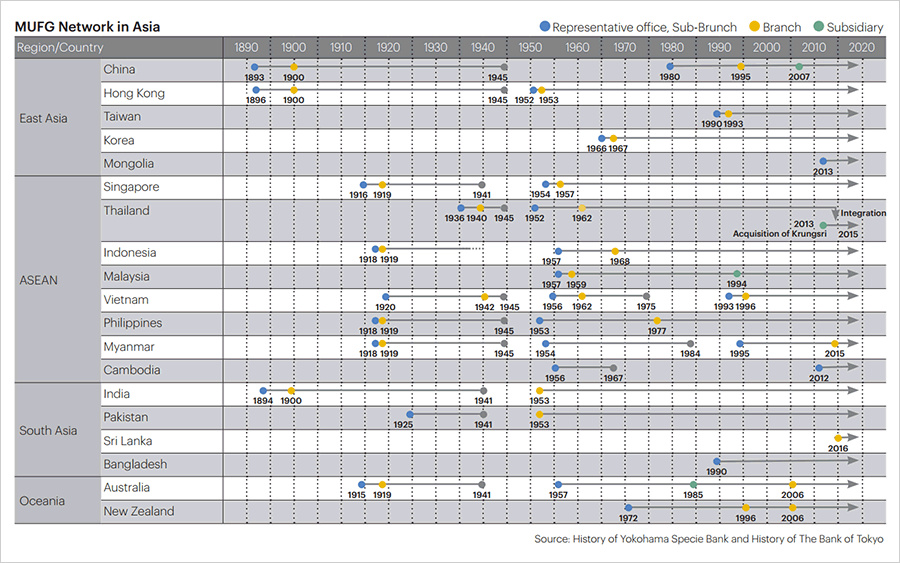
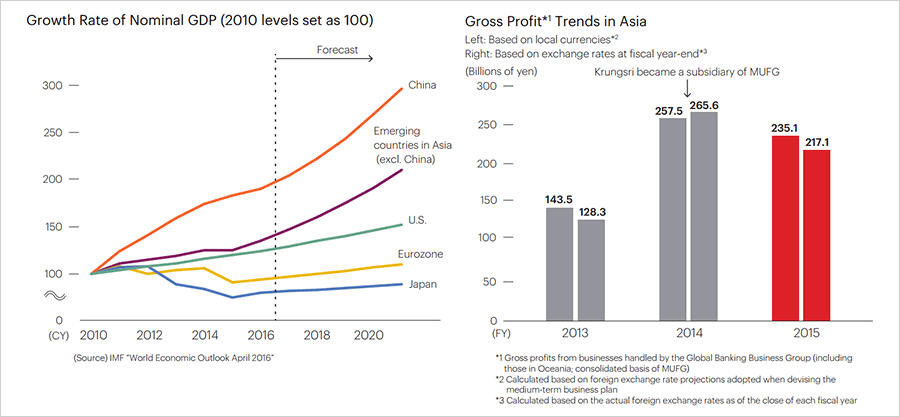
Management Strategies Attuned to Regional Characteristics
Asia encompasses diverse cultures and political systems, and the degree of economic development and financial regulations differ widely by country. With the aim of imple- menting region-specific strategies in a flexible and agile manner, MUFG has defined “East Asia,” “Asia Oceania” and “Krungsri” as key market segments and, has established three headquarters to oversee operations in each of these regions.
In the East Asian region, the economic ties between China, Hong Kong and Taiwan have become stronger in recent years, in effect creating a robust “Greater China” market boasting growing demand for renminbi-denominated settlement services. The Bank of Tokyo-Mitsubishi UFJ (BTMU) has been quick to respond, becoming the first bank to execute a transfer of renminbi between China and Japan in 2010. Moreover, in step with the internationalization of the renminbi, BTMU set up the RMB Internationalization Business Promotion Office in Shanghai in May 2016, stepping up operations related to this up-and-coming global currency.
Meanwhile, in the ASEAN region, which expects to see an expansion of local corporations, a burgeoning of the middle- class and an overall rise in population, there is considerable potential for growth in conventional commercial banking for both individual and corporate customers, including deposit, loan and settlement services. Furthermore, due to a robust labor force and ongoing economic growth, ASEAN countries are attracting a growing number of foreign corporations seeking to secure production bases and penetrate promising local markets where demand potential is high. MUFG is therefore strengthening its local needs-oriented commercial banking business by expanding its business network while acquiring, investing in and pursuing alliances with local banks. In sum, the Group is tirelessly striving to seize growth opportunities arising in the burgeoning economies of ASEAN countries.
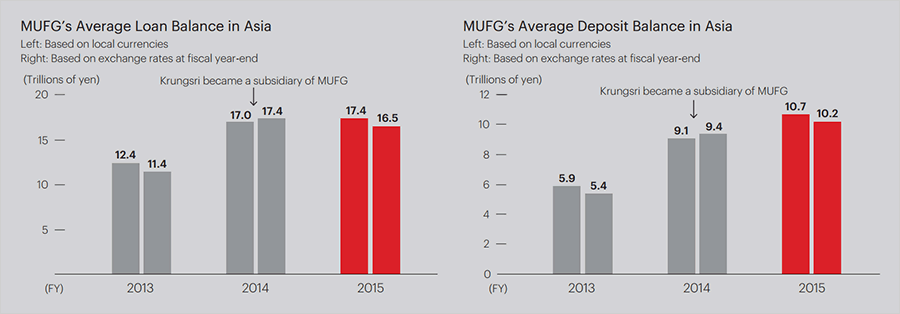
MUFG Deepens Banking Partnership in Thailand
Creating Synergies through Collaboration between Krungsri and BTMU
In December 2013, Krungsri (Bank of Ayudhya), the fifth largest commercial bank in Thailand, became a subsidiary of MUFG. Since its integration with a BTMU branch, Krungsri has been working to realize synergies, playing an ever greater role as a platform for the Group’s the Mekong business* operations.
- * Economic area bound together by the Mekong River, centered in Thailand
Helping Customers Create New Businesses via “Business Matching”

Since 2014, BTMU and Krungsri have fostered new business creation through the organization of “business matching” events that introduce Japanese companies to their Thai counterparts. Successful participants include ABC Cooking Studio Co., Ltd., a BTMU customer that operates cooking studios throughout Japan. In 2014, ABC Cooking Studio opened its first cooking studio in Thailand in Central World Plaza Bangkok, a commercial complex owned by major department store operator the Central Group. Although food stalls are a perennial favorite among locals, there has been a more recent trend toward home cooking, contributing to the roaring success of the studio. “Business matching” has also helped build bonds of partnership between ABC Cooking Studio and Krungsri, which now serves as the former’s main bank in Thailand and provides such services as wage transfers.
Assisting M&As by Global Companies Based in Thailand
With Thailand-based major corporations actively pursuing overseas expansion, the global network and sophisticated product lineup available through BTMU offers great advantages for Krungsri. For example, in 2015, Krungsri and BTMU assisted a major Thai beverage company with the acquisition of an equity stake in a major Vietnamese listed food company. Collaborating with BTMU’s Asia and Oceania headquarters in Singapore and its Ho Chi Minh branch, BTMU and Krungsri are serving as facility agents, with the former providing bridge finance totaling $700 million.
Leveraging the Strengths of Both BTMU and Krungsri
Report from the Risk Management Frontlines
BTMU’s risk management group consists of three Japanese and 208 Thai staff.
Looking back at my footsteps since I was transferred three years ago, the most challenging but rewarding project I was involved in was the integration of the BTMU Bangkok branch and Krungsri. We struggled to iron out the substantial differences between our two organizations’ credit examination systems and relevant rules in the face of a one-year deadline. Through it all, we endeavored to preserve Krungsri’s strengths as a locally-rooted bank while aligning it with in-house BTMU rules that correspond to global standards.
Currently, Krungsri’s business is growing thanks to the success of integrated operations that draw on the strengths of both companies, and we are maintaining the non-performing loan ratio at a relatively low level. Although we have number of challenges going forward, we will strive to achieve the goal of becoming one of Thailand’s top-tier banks.
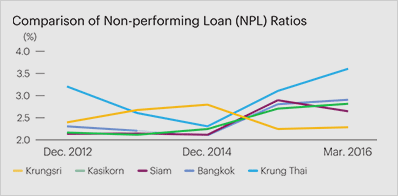
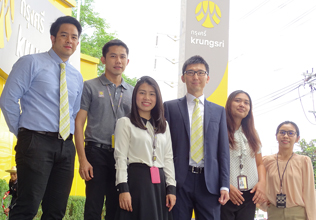
Tomo Kobayashi
Vice President of BTMU, seconded to Krungsri in 2014
Risk management group staff(Mr. Kobayashi is the third person from the right)
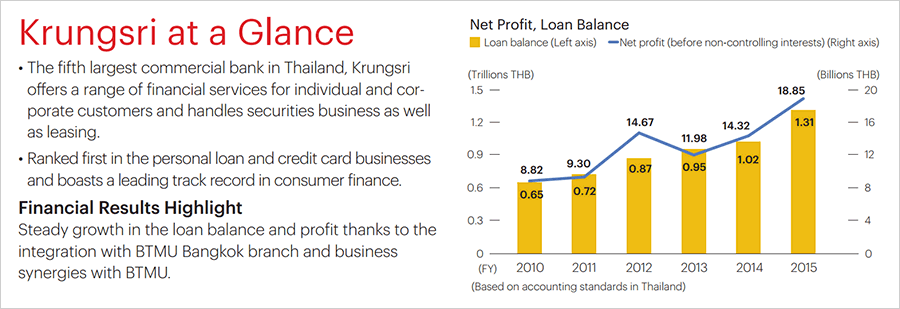
Seizing Opportunities from the Growing Philippine Economy
Capital and Business Alliance with Security Bank in the Philippines
In April 2016, BTMU acquired an approximately 20% equity stake in Philippines-based universal bank Security Bank Corporation, making it an equity-method affiliate, with the goal of strengthening its commercial banking business in that country.
In recent years, the Philippine economy, particularly domestic demand, has been burgeoning. Moreover, the archipelago expects further growth in the long-term, thanks to the second largest ASEAN population, totaling around 100 million. At the same time, as financial services have not adequately penetrated the market, there is considerable room for expansion in the banking sector. MUFG will seize growth opportunities arising from this dynamic economy, with the aim of ensuring a greater presence both in the Philippines and in Asia by helping Security Bank realize its growth strategy.

Attractiveness of the Philippines
(1) Steady economic growth
It has achieved steep economic growth driven by considerable domestic demand and expects further growth backed by a robust population of native English Speakers totaling 100 million with an average age of 23.
(2) Growth potential of banking sector
Because financial services have not yet penetrated the market, the banking sector is expected to grow in step with economic expansion.
(3) Ties with Japan
While Japan serves as the Philippines’ key trading partner, a growing number of Japanese corporations are expanding into the country due to its geographic proximity to other ASEAN nations.
